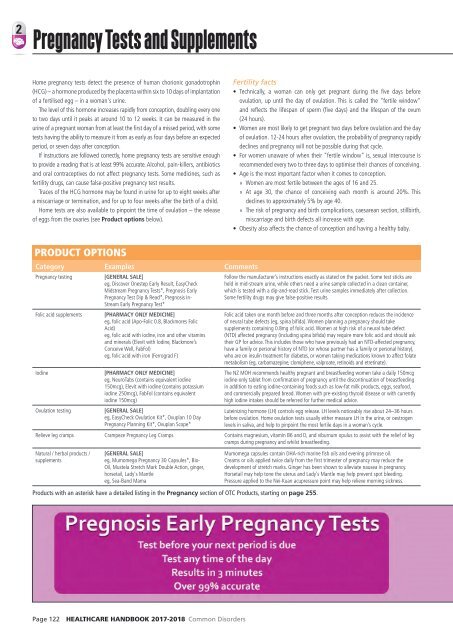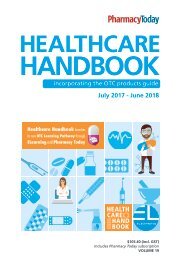2017 HCHB_digital
Create successful ePaper yourself
Turn your PDF publications into a flip-book with our unique Google optimized e-Paper software.
Pregnancy Tests and Supplements<br />
Home pregnancy tests detect the presence of human chorionic gonadotrophin<br />
(HCG) – a hormone produced by the placenta within six to 10 days of implantation<br />
of a fertilised egg – in a woman's urine.<br />
The level of this hormone increases rapidly from conception, doubling every one<br />
to two days until it peaks at around 10 to 12 weeks. It can be measured in the<br />
urine of a pregnant woman from at least the first day of a missed period, with some<br />
tests having the ability to measure it from as early as four days before an expected<br />
period, or seven days after conception.<br />
If instructions are followed correctly, home pregnancy tests are sensitive enough<br />
to provide a reading that is at least 99% accurate. Alcohol, pain-killers, antibiotics<br />
and oral contraceptives do not affect pregnancy tests. Some medicines, such as<br />
fertility drugs, can cause false-positive pregnancy test results.<br />
Traces of the HCG hormone may be found in urine for up to eight weeks after<br />
a miscarriage or termination, and for up to four weeks after the birth of a child.<br />
Home tests are also available to pinpoint the time of ovulation – the release<br />
of eggs from the ovaries (see Product options below).<br />
Fertility facts<br />
• Technically, a woman can only get pregnant during the five days before<br />
ovulation, up until the day of ovulation. This is called the "fertile window"<br />
and reflects the lifespan of sperm (five days) and the lifespan of the ovum<br />
(24 hours).<br />
• Women are most likely to get pregnant two days before ovulation and the day<br />
of ovulation. 12-24 hours after ovulation, the probability of pregnancy rapidly<br />
declines and pregnancy will not be possible during that cycle.<br />
• For women unaware of when their "fertile window" is, sexual intercourse is<br />
recommended every two to three days to optimise their chances of conceiving.<br />
• Age is the most important factor when it comes to conception.<br />
»»<br />
Women are most fertile between the ages of 16 and 25.<br />
»»<br />
At age 30, the chance of conceiving each month is around 20%. This<br />
declines to approximately 5% by age 40.<br />
»»<br />
The risk of pregnancy and birth complications, caesarean section, stillbirth,<br />
miscarriage and birth defects all increase with age.<br />
• Obesity also affects the chance of conception and having a healthy baby.<br />
PRODUCT OPTIONS<br />
Category Examples Comments<br />
Pregnancy testing<br />
Folic acid supplements<br />
Iodine<br />
Ovulation testing<br />
[GENERAL SALE]<br />
eg, Discover Onestep Early Result, EasyCheck<br />
Midstream Pregnancy Tests*, Pregnosis Early<br />
Pregnancy Test Dip & Read*, Pregnosis In-<br />
Stream Early Pregnancy Test*<br />
[PHARMACY ONLY MEDICINE]<br />
eg, folic acid (Apo-Folic 0.8, Blackmores Folic<br />
Acid)<br />
eg, folic acid with iodine, iron and other vitamins<br />
and minerals (Elevit with Iodine, Blackmore’s<br />
Conceive Well, FabFol)<br />
eg, folic acid with iron (Ferrograd F)<br />
[PHARMACY ONLY MEDICINE]<br />
eg, NeuroTabs (contains equivalent iodine<br />
150mcg), Elevit with iodine (contains potassium<br />
iodine 250mcg), FabFol (contains equivalent<br />
iodine 150mcg)<br />
[GENERAL SALE]<br />
eg, EasyCheck Ovulation Kit*, Ovuplan 10 Day<br />
Pregnancy Planning Kit*, Ovuplan Scope*<br />
Follow the manufacturer’s instructions exactly as stated on the packet. Some test sticks are<br />
held in mid-stream urine, while others need a urine sample collected in a clean container,<br />
which is tested with a dip-and-read stick. Test urine samples immediately after collection.<br />
Some fertility drugs may give false-positive results.<br />
Folic acid taken one month before and three months after conception reduces the incidence<br />
of neural tube defects (eg, spina bifida). Women planning a pregnancy should take<br />
supplements containing 0.8mg of folic acid. Women at high risk of a neural tube defect<br />
(NTD) affected pregnancy (including spina bifida) may require more folic acid and should ask<br />
their GP for advice. This includes those who have previously had an NTD-affected pregnancy,<br />
have a family or personal history of NTD (or whose partner has a family or personal history),<br />
who are on insulin treatment for diabetes, or women taking medications known to affect folate<br />
metabolism (eg, carbamazepine, clomiphene, valproate, retinoids and etretinate).<br />
The NZ MOH recommends healthy pregnant and breastfeeding women take a daily 150mcg<br />
iodine-only tablet from confirmation of pregnancy until the discontinuation of breastfeeding<br />
in addition to eating iodine-containing foods such as low-fat milk products, eggs, seafood,<br />
and commercially prepared bread. Women with pre-existing thyroid disease or with currently<br />
high iodine intakes should be referred for further medical advice.<br />
Luteinizing hormone (LH) controls egg release. LH levels noticeably rise about 24–36 hours<br />
before ovulation. Home ovulation tests usually either measure LH in the urine, or oestrogen<br />
levels in saliva, and help to pinpoint the most fertile days in a woman’s cycle.<br />
Relieve leg cramps Crampeze Pregnancy Leg Cramps Contains magnesium, vitamin B6 and D, and viburnum opulus to assist with the relief of leg<br />
cramps during pregnancy and whilst breastfeeding.<br />
Natural / herbal products /<br />
supplements<br />
[GENERAL SALE]<br />
eg, Mumomega Pregnancy 30 Capsules*, Bio-<br />
Oil, Mustela Stretch Mark Double Action, ginger,<br />
horsetail, Lady's Mantle<br />
eg, Sea-Band Mama<br />
Mumomega capsules contain DHA-rich marine fish oils and evening primrose oil.<br />
Creams or oils applied twice daily from the first trimester of pregnancy may reduce the<br />
development of stretch marks. Ginger has been shown to alleviate nausea in pregnancy.<br />
Horsetail may help tone the uterus and Lady's Mantle may help prevent spot bleeding.<br />
Pressure applied to the Nei-Kuan acupressure point may help relieve morning sickness.<br />
Products with an asterisk have a detailed listing in the Pregnancy section of OTC Products, starting on page 255.<br />
Page 122 HEALTHCARE HANDBOOK <strong>2017</strong>-2018 Common Disorders



